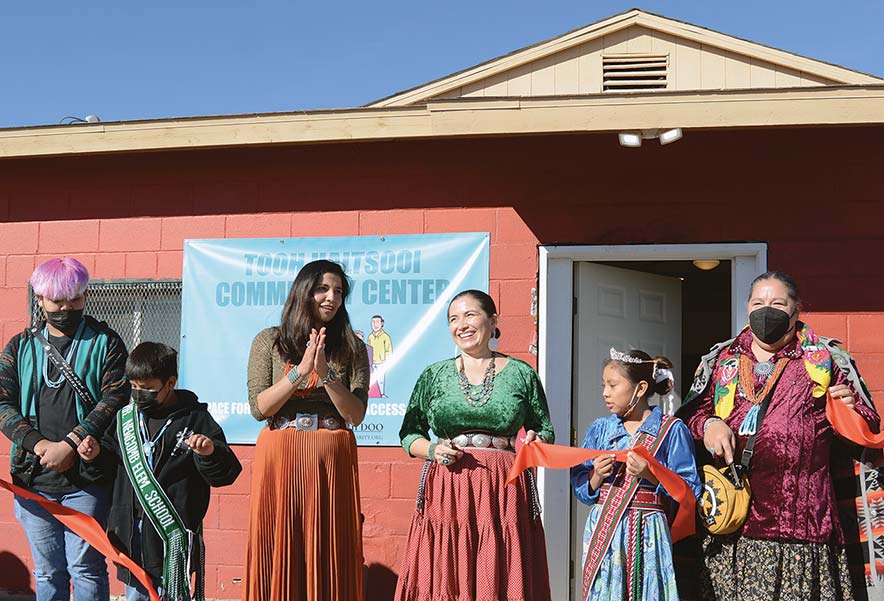
Building saved by demolition is repurposed for community

Navajo Times | Holly James
Ethel Branch, center, smiles after a ribbon-cutting ceremony as Natasha K. Hale, left, and Delegate Amber Crotty, far right, stand by.
Sheep Springs, N.M.
Roselyn Johnson says it really has grown so nizhóní.
She says the community is happy to see this change, and her chapter understands the community’s needs.
Tooh Haltsooi Council of Naataanii Chapter, also known as Sheep Springs Chapter House, models self-reliance and community outreach. It’s active in providing education and resources to its communities.
“We are here to guide this community and expand and grow,” Terrance Suina said.
The chapter provides wellness activities to introduce and promote daily physical health and mental care. A few events the community has hosted are healthy traditional food demonstrations to inspire our relatives to prepare a more nutritious diet.
During the holidays, the locals raise funds and donations to distribute gifts for the kids and movie nights, where healthy snacks are also provided. They also have a monthly theme to incorporate awareness regarding suicide prevention, diabetes, and other areas to nurture mental well-being.
Their chapter is prideful of the donations that they seek and receive from a wide variety of non-profits and local businesses. It accepts donations of grocery store gift cards, food vouchers, holiday dinners, winter clothing, and so much more for its community.
“Our efforts are not just for our chapter,” said Kevin M. Begay, the executive chapter manager.
Begay, whose clans are Kinyaa’áanii, Tó’aheedlíinii, Honágháahnii, and Táchii’nii.
“We don’t turn away anyone; we are committed to serving anyone in need,” Begay said.
The creative outlets the Tooh Haltsooi Chapter explores has led to much success and little to no fund being spent for big projects so it can revert those funds into the community.
The chapter also has an impressive four-year track record of clean audits, which out of 110 chapters across the Nation, is a rare accomplishment to be proud of.
Tooh Halstsooi Chapter established a partnership with Yee Ha’ólníi Doo during the pandemic (DBA Navajo & Hopi Families COVID-19 Relief Fund).
While the Navajo Nation was still scrambling to unite and organize, Branch’s team and Tooh Haltsooi Chapter were already on the front lines braving the unknown elements and bringing aid to the people. Tooh Halstsooi Chapter was designated as the point of distribution for all Northern Navajo distributing PPE and food during the onset of the illness that ravaged our Navajo Nation.
Repurposing, which was once a laundromat, then a storage shed housing non-perishable items during the pandemic, has shown its resilience in transformation, providing a modern and technology equipped resource center for the community.
Not one penny came from the Navajo Nation.
Begay explains after many leaps and bounds of requesting funding assistance from the Nation for this project resulted in no success.
Obtaining funding from the Nation is known for its dated rules and highly restrictive, complicated, and timely process. The process, at most times, can feel like it is designed for failure.
Funds intended for projects like this that go unused are reverted to the government year after year, which is a tremendous loss for growth that impacts the well-being of all members of the Nation.
After a continued request for funding efforts fizzled out throughout the Nation, they sought other avenues.
Begay and the chapter officials decided they would instead repurpose the current structure as an alternative to building a new structure, foreseeing it would likely take years because of the endless bureaucracy. The chapter set out and began its initiative to repurpose the building and started networking.
“We had to reach out to many non-profits,” Begay said. “We had to reach out to as many as we could to help us get to a financial goal to be able to do what we needed to provide here at the community level.”
Tooth Haltsooi Chapter was able to reconnect with Ethel Branch through Yee Ha’ólníi Doo, which had already broken ground on the first innovation hub opening in Monument Valley in August 2021.
The chapter also reached out for help from its delegate, Amber Kanazbah Crotty. Financial assistance was provided through a grant from the W.K. Kellogg Foundation, which Natasha K. Hale (who was with the foundation at the time) introduced to Branch.
“This is the first step in reclaiming that we are as Diné people at the local community level and moving away from complete reliance on a government,” Branch said.
The innovation hub has open conference room space that can be used as a classroom or workshop. There is a business center equipped with new computers, a printer, a library stocked with books on Indigenous culture, couches, plenty of seating, and a kitchen with refrigerator, sink, and amenities.








 Highway 264,
Highway 264, I-40, WB @ Winslow
I-40, WB @ Winslow